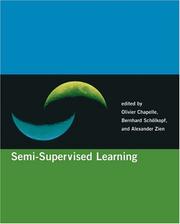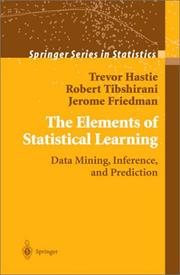| Listing 1 - 7 of 7 |
Sort by
|
Book
ISBN: 3031175875 3031175867 Year: 2022 Publisher: Cham, Switzerland : Springer,
Abstract | Keywords | Export | Availability | Bookmark
 Loading...
Loading...Choose an application
- Reference Manager
- EndNote
- RefWorks (Direct export to RefWorks)
Book
ISBN: 9780262301183 9780262017183 0262017180 0262301180 1280678356 9786613655288 0262300397 0262526034 Year: 2012 Publisher: Cambridge The MIT Press
Abstract | Keywords | Export | Availability | Bookmark
 Loading...
Loading...Choose an application
- Reference Manager
- EndNote
- RefWorks (Direct export to RefWorks)
Boosting is an approach to machine learning based on the idea of creating a highly accurate predictor by combining many weak and inaccurate "rules of thumb." A remarkably rich theory has evolved around boosting, with connections to a range of topics, including statistics, game theory, convex optimization, and information geometry. Boosting algorithms have also enjoyed practical success in such fields as biology, vision, and speech processing. At various times in its history, boosting has been perceived as mysterious, controversial, even paradoxical.This book, written by the inventors of the method, brings together, organizes, simplifies, and substantially extends two decades of research on boosting, presenting both theory and applications in a way that is accessible to readers from diverse backgrounds while also providing an authoritative reference for advanced researchers. With its introductory treatment of all material and its inclusion of exercises in every chapter, the book is appropriate for course use as well. The book begins with a general introduction to machine learning algorithms and their analysis; then explores the core theory of boosting, especially its ability to generalize; examines some of the myriad other theoretical viewpoints that help to explain and understand boosting; provides practical extensions of boosting for more complex learning problems; and finally presents a number of advanced theoretical topics. Numerous applications and practical illustrations are offered throughout.

ISBN: 9780262033589 0262033585 0262255898 1282096184 1429414081 9780262255899 9781282096189 9781429414081 9780262514125 0262514125 Year: 2006 Publisher: Cambridge, Mass. MIT Press
Abstract | Keywords | Export | Availability | Bookmark
 Loading...
Loading...Choose an application
- Reference Manager
- EndNote
- RefWorks (Direct export to RefWorks)
A comprehensive review of an area of machine learning that deals with the use of unlabeled data in classification problems, this text looks at state-of-the-art algorithms, applications benchmark experiments, and directions for future research.
Computer assisted instruction --- Supervised learning (Machine learning) --- Apprentissage supervisé (Intelligence artificielle) --- Supervised learning (Machine learning). --- Apprentissage supervisé (Intelligence artificielle) --- Learning, Supervised (Machine learning) --- Machine learning --- Computer science --- E-books --- COMPUTER SCIENCE/Machine Learning & Neural Networks
Book
ISBN: 303001620X 3030016196 Year: 2018 Publisher: Cham : Springer International Publishing : Imprint: Springer,
Abstract | Keywords | Export | Availability | Bookmark
 Loading...
Loading...Choose an application
- Reference Manager
- EndNote
- RefWorks (Direct export to RefWorks)
This SpringerBrief covers the technical material related to large scale hierarchical classification (LSHC). HC is an important machine learning problem that has been researched and explored extensively in the past few years. In this book, the authors provide a comprehensive overview of various state-of-the-art existing methods and algorithms that were developed to solve the HC problem in large scale domains. Several challenges faced by LSHC is discussed in detail such as: 1. High imbalance between classes at different levels of the hierarchy 2. Incorporating relationships during model learning leads to optimization issues 3. Feature selection 4. Scalability due to large number of examples, features and classes 5. Hierarchical inconsistencies 6. Error propagation due to multiple decisions involved in making predictions for top-down methods The brief also demonstrates how multiple hierarchies can be leveraged for improving the HC performance using different Multi-Task Learning (MTL) frameworks. The purpose of this book is two-fold: 1. Help novice researchers/beginners to get up to speed by providing a comprehensive overview of several existing techniques. 2. Provide several research directions that have not yet been explored extensively to advance the research boundaries in HC. New approaches discussed in this book include detailed information corresponding to the hierarchical inconsistencies, multi-task learning and feature selection for HC. Its results are highly competitive with the state-of-the-art approaches in the literature.
Supervised learning (Machine learning) --- Learning, Supervised (Machine learning) --- Machine learning --- Data mining. --- Artificial intelligence. --- Data Mining and Knowledge Discovery. --- Artificial Intelligence. --- AI (Artificial intelligence) --- Artificial thinking --- Electronic brains --- Intellectronics --- Intelligence, Artificial --- Intelligent machines --- Machine intelligence --- Thinking, Artificial --- Bionics --- Cognitive science --- Digital computer simulation --- Electronic data processing --- Logic machines --- Machine theory --- Self-organizing systems --- Simulation methods --- Fifth generation computers --- Neural computers --- Algorithmic knowledge discovery --- Factual data analysis --- KDD (Information retrieval) --- Knowledge discovery in data --- Knowledge discovery in databases --- Mining, Data --- Database searching
Book
ISBN: 1489993401 1441980199 9786613704801 1441980202 1280794410 Year: 2012 Publisher: New York : Springer,
Abstract | Keywords | Export | Availability | Bookmark
 Loading...
Loading...Choose an application
- Reference Manager
- EndNote
- RefWorks (Direct export to RefWorks)
Recent decades have seen rapid advances in automatization processes, supported by modern machines and computers. The result is significant increases in system complexity and state changes, information sources, the need for faster data handling and the integration of environmental influences. Intelligent systems, equipped with a taxonomy of data-driven system identification and machine learning algorithms, can handle these problems partially. Conventional learning algorithms in a batch off-line setting fail whenever dynamic changes of the process appear due to non-stationary environments and external influences. Learning in Non-Stationary Environments: Methods and Applications offers a wide-ranging, comprehensive review of recent developments and important methodologies in the field. The coverage focuses on dynamic learning in unsupervised problems, dynamic learning in supervised classification and dynamic learning in supervised regression problems. A later section is dedicated to applications in which dynamic learning methods serve as keystones for achieving models with high accuracy. Rather than rely on a mathematical theorem/proof style, the editors highlight numerous figures, tables, examples and applications, together with their explanations. This approach offers a useful basis for further investigation and fresh ideas and motivates and inspires newcomers to explore this promising and still emerging field of research. .
Computational intelligence. --- Machine learning. --- Machine learning --- Computational intelligence --- Engineering & Applied Sciences --- Computer Science --- Supervised learning (Machine learning) --- Learning, Supervised (Machine learning) --- Learning, Machine --- Engineering. --- Data mining. --- Pattern recognition. --- Computational Intelligence. --- Data Mining and Knowledge Discovery. --- Pattern Recognition. --- Intelligence, Computational --- Artificial intelligence --- Soft computing --- Design perception --- Pattern recognition --- Form perception --- Perception --- Figure-ground perception --- Algorithmic knowledge discovery --- Factual data analysis --- KDD (Information retrieval) --- Knowledge discovery in data --- Knowledge discovery in databases --- Mining, Data --- Database searching --- Construction --- Industrial arts --- Technology --- Machine theory --- Optical pattern recognition. --- Optical data processing --- Pattern perception --- Perceptrons --- Visual discrimination
Book
ISBN: 3642294901 364229491X Year: 2013 Publisher: Heidelberg ; New York : Springer,
Abstract | Keywords | Export | Availability | Bookmark
 Loading...
Loading...Choose an application
- Reference Manager
- EndNote
- RefWorks (Direct export to RefWorks)
Recent advancements in the field of telecommunications, medical imaging and signal processing deal with signals that are inherently time varying, nonlinear and complex-valued. The time varying, nonlinear characteristics of these signals can be effectively analyzed using artificial neural networks. Furthermore, to efficiently preserve the physical characteristics of these complex-valued signals, it is important to develop complex-valued neural networks and derive their learning algorithms to represent these signals at every step of the learning process. This monograph comprises a collection of new supervised learning algorithms along with novel architectures for complex-valued neural networks. The concepts of meta-cognition equipped with a self-regulated learning have been known to be the best human learning strategy. In this monograph, the principles of meta-cognition have been introduced for complex-valued neural networks in both the batch and sequential learning modes. For applications where the computation time of the training process is critical, a fast learning complex-valued neural network called as a fully complex-valued relaxation network along with its learning algorithm has been presented. The presence of orthogonal decision boundaries helps complex-valued neural networks to outperform real-valued networks in performing classification tasks. This aspect has been highlighted. The performances of various complex-valued neural networks are evaluated on a set of benchmark and real-world function approximation and real-valued classification problems.
Engineering & Applied Sciences --- Computer Science --- Supervised learning (Machine learning) --- Neural networks (Computer science) --- Artificial neural networks --- Nets, Neural (Computer science) --- Networks, Neural (Computer science) --- Neural nets (Computer science) --- Learning, Supervised (Machine learning) --- Engineering. --- Computational intelligence. --- Computational Intelligence. --- Signal, Image and Speech Processing. --- Intelligence, Computational --- Artificial intelligence --- Soft computing --- Construction --- Industrial arts --- Technology --- Natural computation --- Machine learning --- Signal processing. --- Image processing. --- Speech processing systems. --- Computational linguistics --- Electronic systems --- Information theory --- Modulation theory --- Oral communication --- Speech --- Telecommunication --- Singing voice synthesizers --- Pictorial data processing --- Picture processing --- Processing, Image --- Imaging systems --- Optical data processing --- Processing, Signal --- Information measurement --- Signal theory (Telecommunication)

ISBN: 0387952845 9780387952840 3540952845 Year: 2001 Publisher: Berlin : Springer,
Abstract | Keywords | Export | Availability | Bookmark
 Loading...
Loading...Choose an application
- Reference Manager
- EndNote
- RefWorks (Direct export to RefWorks)
519.2 --- 519.23 --- Supervised learning (Machine learning) --- 681.3*I26 --- 519.23 Statistical analysis. Inference methods --- Statistical analysis. Inference methods --- 519.2 Probability. Mathematical statistics --- Probability. Mathematical statistics --- 681.3*I26 Learning: analogies concept learning induction knowledge acquisition language acquisition parameter learning (Artificial intelligence)--See also {681.3*K32} --- Learning: analogies concept learning induction knowledge acquisition language acquisition parameter learning (Artificial intelligence)--See also {681.3*K32} --- Learning, Supervised (Machine learning) --- Machine learning --- Learning strategies --- Stratégies d'apprentissage --- 006.31 --- Learning: analogies; concept learning; induction; knowledge acquisition; language acquisition; parameter learning (Artificial intelligence)--See also {681.3*K32} --- 681.3*I26 Learning: analogies; concept learning; induction; knowledge acquisition; language acquisition; parameter learning (Artificial intelligence)--See also {681.3*K32} --- Supervised learning (Machine learning). --- Stratégies d'apprentissage --- wiskundige statistiek --- regressie-analyse --- lineaire programmering --- dataverwerking --- informatietechnologie --- mathematische modellen, toegepast op bedrijfsleven --- Artificial intelligence. Robotics. Simulation. Graphics --- Mathematical statistics --- Basic Sciences. Statistics --- Statistics (General). --- Research --- Recherche --- MACHINE LEARNING -- 516 --- STATISTICAL LEARNING -- 516 --- SUPERVISED LEARNING -- 516 --- Supervised learning (machine learning)
| Listing 1 - 7 of 7 |
Sort by
|

 Search
Search Feedback
Feedback About UniCat
About UniCat  Help
Help News
News